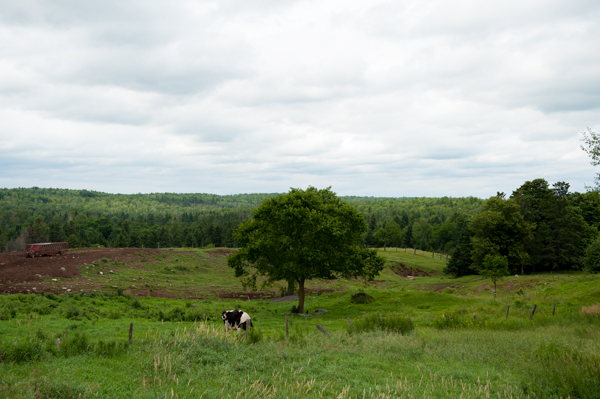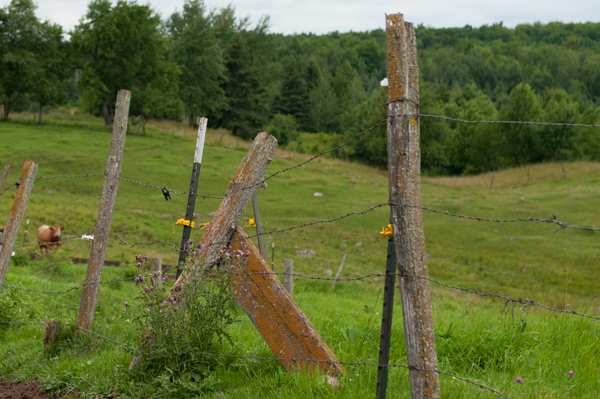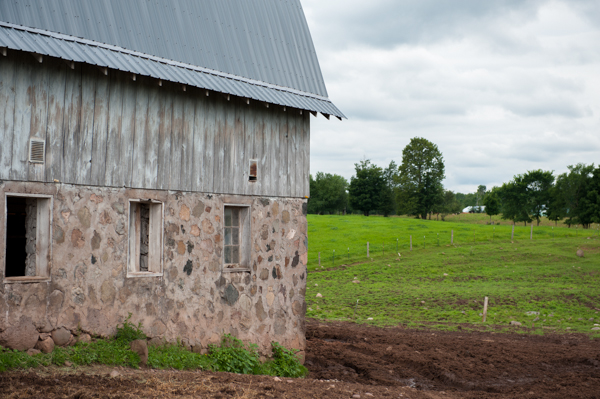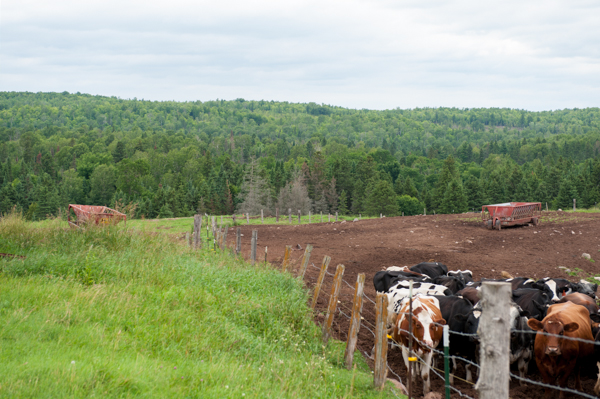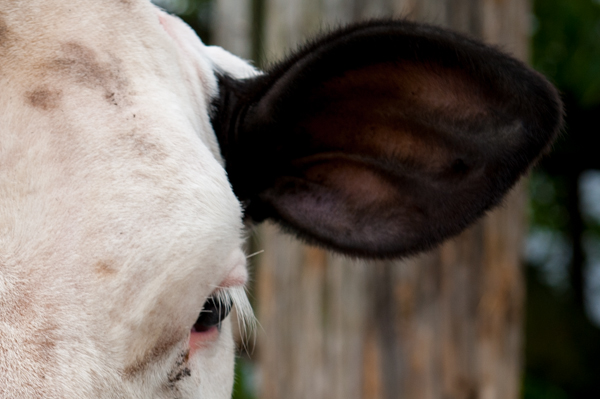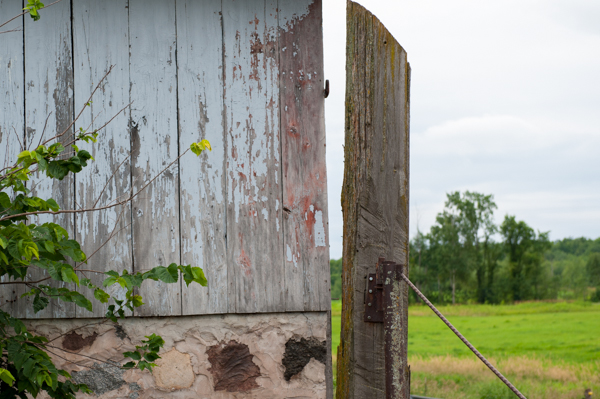'Good farmers, who take seriously their duties as stewards of Creation and of their land's inheritors, contribute to the welfare of society in more ways than society usually acknowledges, or even knows. These farmers produce valuable goods, of course; but they also conserve soil, they conserve water, they conserve wildlife, they conserve open space, they conserve scenery.'
Wendell Berry, Bringing it to the Table: Writings on Farming and Food.
I owe my introduction to the O'Dovero-Flesia farm to my quest for a seriously good hot dog. My preferred hot dog supplier, a meat market in Mellen, exited the sausage business a few years ago and while Hebrew Nationals are a good substitute, they just weren't the same. Everything changed when Pete told me about the O'Dovero's cattle farm and meat market— I was back in all beef, natural casing with a satisfying snap hot dog heaven. And, lucky for me, O'Dovero-Flesia heaven also included dry aged beef, the perfect pork belly for pancetta and a picturesque collection of cows, buildings and pastures.
Five generations of O'Dovero's have called these 1,000 acres at the base of the Penokee Hills home and as I pulled into the driveway, I can understand why— it's beautiful. The undulating pastures are framed by hardwood and pine forest, the Penokee hills rise up in the background and two barns with field stone foundations (built in the late 1920's/early 1930's) wear the weathered patina of 87 years of Wisconsin rain, wind, snow and sun.
The extraordinary (or not, depending on how you look at it) thing is it's still a working farm— raising cattle and supporting a family who are rooted in this place as much as the trees are rooted in the hillside. After nearly 90 years of mindful animal and land stewardship, the farm and family are faced with a nearly incomprehensible challenge— legislation has been purchased by an out of state mining company to allow an open-pit iron ore mine, literally, in their backyard. GTac, a Florida company owned by the 'New King of Coal' Chris Cline, plans to detonate 5.5 million tons of explosives every nine days until the pit measures 4.5 miles long— all within a mile of the O'Dovero's pastures, barns, cattle and home. It goes without saying, they are in a fight for their lives.
The cows on the farm reminded me of George, inquisitive and friendly. They were well taken care of and it showed in their demeanor and appearance. The best part of the day was speaking to Margaret, a member of the fifth generation and Veterinary student, about her connection to the farm and what's at stake if GTac starts to blow up the hills behind her house. The land, water and animals will be sacrificed, without consideration from a company who used money (and lots of it) to unethically re-write legislation to indemnify themselves from the damages that are inherent with any extraction industry.
Aldo Leopold said, 'There are two spiritual dangers in not owning a farm. One is the danger of supposing that breakfast comes from the grocery, and the other that heat comes from the furnace.' Since I am an enthusiastic meat-eater as well as a passionate animal lover, two seemingly contradictory terms, I spent some time thinking about the sacrifices inherent when we harvest, anything, for our consumption. How should we honor the harvest of any animal, plant or mountaintop for our dinner table, gas tank or warship? Acknowledging that sacrifice starts with mindful consumption, re-using what we can and remembering, always, that the resources we have are not endless.
Incredibly, thanks to our disconnected and pseudo-sanitized food system, we are able to purchase a plastic wrapped package of beef with an expiration date and a price on it and think the only components of the transaction are the exchange of currency at the checkout aisle. We forget, or choose to ignore, the elemental transaction that occurred on the farm, where the cow was raised and harvested. Because of this sense of separateness, we also forget that the knives we purchase, the cars we drive or the railroads used to transport our toilet paper were once deep in the earth, under mountaintops standing sentry over farms and communities. That's why farms like the O'Dovero's are important— they haven't forgotten and they understand the sacrifice they are asking of the animals in their care.
It's easy to pretend the meat we eat came from cows as happy as the O'Dovero cows or the steel in our cars came from a remote mountaintop without ties to a family's stories or traditions if we disregard an elemental truth— everything is connected. Albert Einstein said, 'A human being is a part of the whole called by us universe, a part limited in time and space. He experiences himself, his thoughts and feeling as something separated from the rest, a kind of optical delusion of his consciousness. This delusion is a kind of prison for us, restricting us to our personal desires and to affection for a few persons nearest to us. Our task must be to free ourselves from this prison by widening our circle of compassion to embrace all living creatures and the whole of nature in its beauty.' Once we free ourselves from the prison of separateness and we evaluate our consumption in the context of what sacrifices are necessary to fill our bellies, drive our cars or build warships, it's a game changer.
I drive a car, I use appliances and I'm sure there is a steel I-beam somewhere in my house but I can no longer ignore the fact that these conveniences extracted a cost somewhere, to a family or community who sacrificed their mountaintops, forests or clean water. The recognition of the inherent sacrifice in everything we consume begs the question— what do we value as a society? If the only currency that gets any traction is the almighty dollar, how do we begin to assign value to clean water, unmolested forests, healthy communities and happy cows? What is a sustainable and good way of life really worth? I know it feels like cool water rushing over my feet when I'm walking down a river bed. I know it sounds like the waves of Lake Superior lapping along the shore on Long Island. I know it looks like a group of cows resting in a bucolic meadow of a family farm. Why is it so hard to convince people that it's worth protecting? Is it because we are using the wrong currency?
Is a family farm like the O'Dovero's reason enough to stop a mine? Are the sacrifices GTac is asking of us worth it? On the surface, it seems like a simple proposition— Northern Wisconsin needs jobs and the iron ore in the ground has value, so the sacrifice of one family farm is a fair trade for 'economic prosperity'. But if we dig deeper and look at what's really on the chopping block, it becomes clear that considering only the economic component of the deal is short-sighted. What is the true cost of removing five generations of a family's stories and legacy from the land? What is the inherent value of the Bad River Watershed? How can we quantify what destroying hundreds of acres of trees, ferns, flowers, wild berries and mushrooms will mean to the people and animals who live in the Penokees? Maybe the most precious currencies go beyond empirical value and as a result, require very, very careful consideration when we are asking for their sacrifice. The Penokee hills, the Bad River Watershed, Lake Superior and the O'Dovero-Flesia farm are worth saving— the sacrifices are too great.





